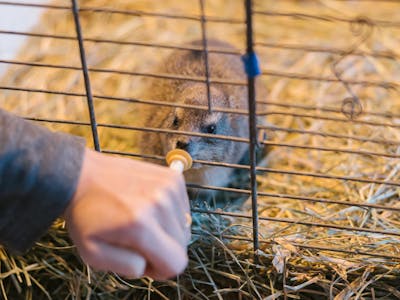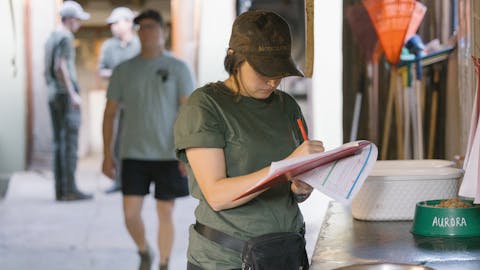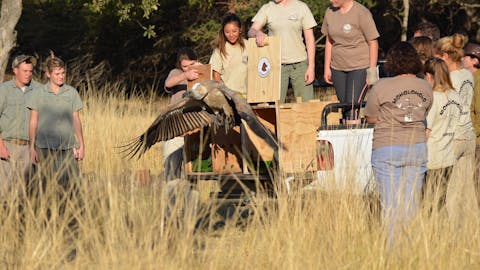WILDLIFE VOLUNTEERING: THE RED FLAGS MOST PEOPLE MISS
Learn more
Wildlife Rehabilitation Placement
Gain hands-on animal care experience in one of Africa’s leading wildlife sanctuaries.
Created for qualified and student animal specialists, our Wildlife Rehabilitation Placement gives you the chance to gain hands-on experience in one of Africa’s largest animal rehabilitation centres and contribute to the welfare of the project’s long-term residents.
Throughout your placement, you’ll take part in the daily management of a diverse range of species requiring specialist support - from raptors with wing injuries to apex predators receiving lifelong sanctuary.
Day to day, your role may involve assisting with enrichment strategies to reduce stress, supporting enclosure maintenance to meet welfare standards, or working alongside experienced veterinary staff where you’ll gain valuable insights into wound care, restraint techniques, and animal monitoring.
For those with a professional passion for zoology, animal care or veterinary practice, this placement offers a rare opportunity to deepen your practical skills in one of Africa’s most respected wildlife centres.



Sharpen your skills in animal care and veterinary support
Depending on your experience, you’ll get to hone your skills in animal and clinical care, veterinary support, nutrition, husbandry and behavioural enrichment - in a dedicated on-site clinic with expert supervision from a specialist project team.
Work with Africa’s iconic species
Deepen your understanding of species-specific behaviour, physiology and husbandry by working with species such as lions, leopards, cheetahs, African wild dogs, hyenas, honey badgers, vultures, caracals, bushbabies and antelope.
Support wildlife conservation in the Greater Kruger
As a wildlife care professional or student, your skills and knowledge will help the project team respond to the increasing number of animals injured by poaching, road incidents, poisoning or habitat encroachment in the Greater Kruger region.
Collaborate with the Endangered Wildlife Trust
Through the project’s close partnership with the EWT, you’ll contribute to high-impact conservation initiatives - from safeguarding endangered vulture populations to data collection and recovery of poisoned raptors.
Explore behaviour and ecology in the field
Located within a 1,000-acre reserve, the sanctuary enables you to observe animal behaviour in semi-wild settings. Guided game drives and bush walks will introduce you to animal tracking, anti-poaching and ecological monitoring practices - all in a spectacular natural habitat.
Contribute to raptor conservation
Play a role in helping to save and care for endangered vultures and other birds of prey. You’ll assist with the rehabilitation process and help manage vulture feeding stations (vulture restaurants) that provide a safe haven for many endangered raptor species.
Join a collaborative and professional team
Live and work alongside professionals in South Africa. With a supportive and social atmosphere, it’s an ideal place to exchange knowledge, build connections, and form lifelong networks in the wildlife care and conservation sector.
Support community-focused conservation
Gain insight into the centre’s work with local landowners, communities and farmers, who are key to mitigating human-wildlife conflict. Learn how conservation and animal welfare depend on building long-term local partnerships grounded in education, trust and shared responsibility.
Care for orphaned infant wildlife (seasonal - peak activity from November to March)
Look after the physical, emotional and dietary needs of young animals separated from their mothers - grooming, feeding and providing mental stimulation for a variety of species including young carnivores, reptiles, primates and birds of prey.
You’ll support the project team and apply your skills to hands-on animal care work. Depending on your level of experience, length of stay, the centre’s priorities and the animals’ welfare needs at the time, this will include a range of the following responsibilities.
Rehabilitation, care and husbandry
Wherever possible, you’ll help to rehabilitate healthy animals back into the wild. Where an injury is too severe or an animal’s territorial nature and complex social structures make it impossible to release them, you’ll help provide life-long care in the sanctuary instead.
You will get to observe or assist:
- Enriching their lives through physical exercise, mental stimulation, and creating a natural setting in captivity.
- Providing assistance with preparing animal feed and feeding the animals.
- Mucking-out enclosures, rake grass for bedding and create clean living spaces for animals.
You could also observe or assist:
- Preparing and releasing animals onto the project’s wildlife reserve.
Research and practical conservation work
As well as working in a wildlife sanctuary, you’ll assist the project team’s work to support wildlife living in the surrounding region.
You will get to observe or assist:
- Providing a safe area for the wild vultures of the Drakensberg Mountains to feed, free from the risks of poisoning.
You could also observe or assist:
- Rescuing, quarantining and releasing animals such as honey badgers, servals, caracals, mongooses, leopards and rock hyraxes, who are placing themselves at risk by troubling local farmers.
Caring for young wildlife (seasonal - peak activity from November to March)
Looking after young animals can be particularly rewarding but they require lots of special attention - just like human infants, in fact! You could observe or assist:
- Preparing food or formula.
- Bottle-feeding young animals or by another method, depending on the species.
- Providing regular care and monitoring.
- Integrating juvenile animals into an enclosure with other animals.
Veterinary nursing
Most animals arrive at wildlife rehabilitation centres with some level of injury or trauma. Depending on the work that comes in and your level of experience, you may get to support the project’s animal care professionals with veterinary work. You could observe or assist:
- Working in a well-equipped clinic located on-site.
- Treating and caring for injured animals.
- Dressing wounds, giving medical treatment and monitoring sick animals.
- Performing regular health checks.
- Preparing nutritious diets.
- Stabilising and integrating new arrivals into the population at the centre.
Game drives
You could get to experience a selection of additional activities:
- Game drives in the surrounding reserve - home to a wide variety of animals released from the rehabilitation centre.
- An optional excursion to Kruger National Park (subject to availability and additional costs).
You’ll learn about the care and rehabilitation of many different species, as well as their behaviour, biology, ecology and conservation issues. Depending on the animals being cared for and the centre’s work at the time, this will include a range of the following topics.
Animal husbandry
- Individual dietary requirements for different captive species, including food preparation, water provision, and feeding routines.
- Best hygiene practices, such as enclosure cleaning, disinfection of areas and waste removal.
- How to monitor the health and behaviour of different captive species.
- The reproductive management of captive species such as lions.
Behaviour
- The behaviours of African animals, both in the wild and in captivity.
- The methods of enrichment used for different species and how this benefits the animal’s welfare.
- How animals communicate with each other.
Biology
- The physiology and biology of predators including lion, leopard and hyena as well as other African animals at the centre.
- Wildlife reproduction and how different species take care of their young.
- The optimum captive environments for different species.
- Best practices for treating wounded and injured wildlife.
Ecology
- The natural habitats of animals you’re working with and their role in the ecosystem.
Conservation
- The causes of, and potential solutions to, human-wildlife conflict.
- How to stabilise and integrate new arrivals into the population at the centre.
- Methods used by poachers such as snares - you may even see some animals arrive at the sanctuary with snare injuries.
- The important role animal care centres play in the broader wildlife conservation movement.
This project contributes to a variety of the UN’s Sustainable Development Goals. As part of the team, so will you.
The content of this publication has not been approved by the United Nations and does not reflect the views of the United Nations or its officials or Member States.
Quality Education Ensure inclusive and equitable quality education and promote lifelong learning opportunities for all

Alongside animal work, this project doubles as an educational centre. Over 300,000 local primary and secondary school children have visited the project to learn about wildlife care and conservation from the project’s expert team.
In partnership with us, this project also provides financial support for a nearby creche and agricultural training centre. These initiatives provide vocational training and support for local people to find and keep good jobs.
Gender Equality Achieve gender equality and empower all women and girls

This project provides equal employment opportunities for local women and men and equal volunteering opportunities for women and men outside the local community.
Clean Water and Sanitation Ensure availability and sustainable management of water and sanitation for all

This project conserves important inland freshwater ecosystems through the rehabilitation and release of keystone aquatic species.
Decent Work and Economic Growth Promote sustained, inclusive and sustainable economic growth, full and productive employment and decent work for all

This project routinely employs young people between 15 and 24 and provides equal employment opportunities for local men and women. Volunteers provide both economic and physical support, facilitating important conservation work and education within the local community.
Reduced Inequalities Reduce inequality within and among countries

This project requires participants to pay for volunteering, which supports their conservation and community activities. They offer a reduced rate for South African volunteers to promote inclusion among local people.
Sustainable Cities and Communities Make cities and human settlements inclusive, safe, resilient and sustainable

This project protects the world’s natural heritage through conservation, via the rehabilitation and safe release of African species.
Responsible Consumption and Production Ensure sustainable consumption and production patterns

This project promotes responsible tourism in a variety of ways: through the creation of local jobs; via community work that sustains local cultures; by educating international and local visitors on how to live in harmony with nature; and in its vital conservation work.
The project also takes a responsible approach to the consumption and disposal of resources - from recycling waste to using carcasses of deceased animals in their ‘vulture restaurant’, an important breeding site for endangered vulture species.
Life on Land Protect, restore and promote sustainable use of terrestrial ecosystems, sustainably manage forests, combat desertification, and halt and reverse land degradation and halt biodiversity loss

This project takes significant action to halt the loss of biodiversity and prevent the extinction of threatened species. By rehabilitating and releasing sick, injured and poisoned wildlife, they play a powerful role in preventing the degradation of South Africa’s forest, wetland, mountain and dryland ecosystems.
The project also takes urgent action to prevent poaching, by rescuing the animal victims of mass poisoning events before they pass into the hands of poachers. The centre also educates visitors on the poaching crisis and deters poachers from entering the surrounding reserve.
Peace, Justice and Strong Institutions Promote peaceful and inclusive societies for sustainable development, provide access to justice for all and build effective, accountable and inclusive institutions at all levels

Through their work in treating the victims of mass poisonings, and the activity in the centre and surrounding reserve, the project is combating poachers and reducing the unethical practices associated with their activities.
Partnerships for the goals Strengthen the means of implementation and revitalise the Global Partnership for Sustainable Development

Through this project’s partnership with us, they draw in financial resources that are used to fund conservation and provide support to their community partners in South Africa.




